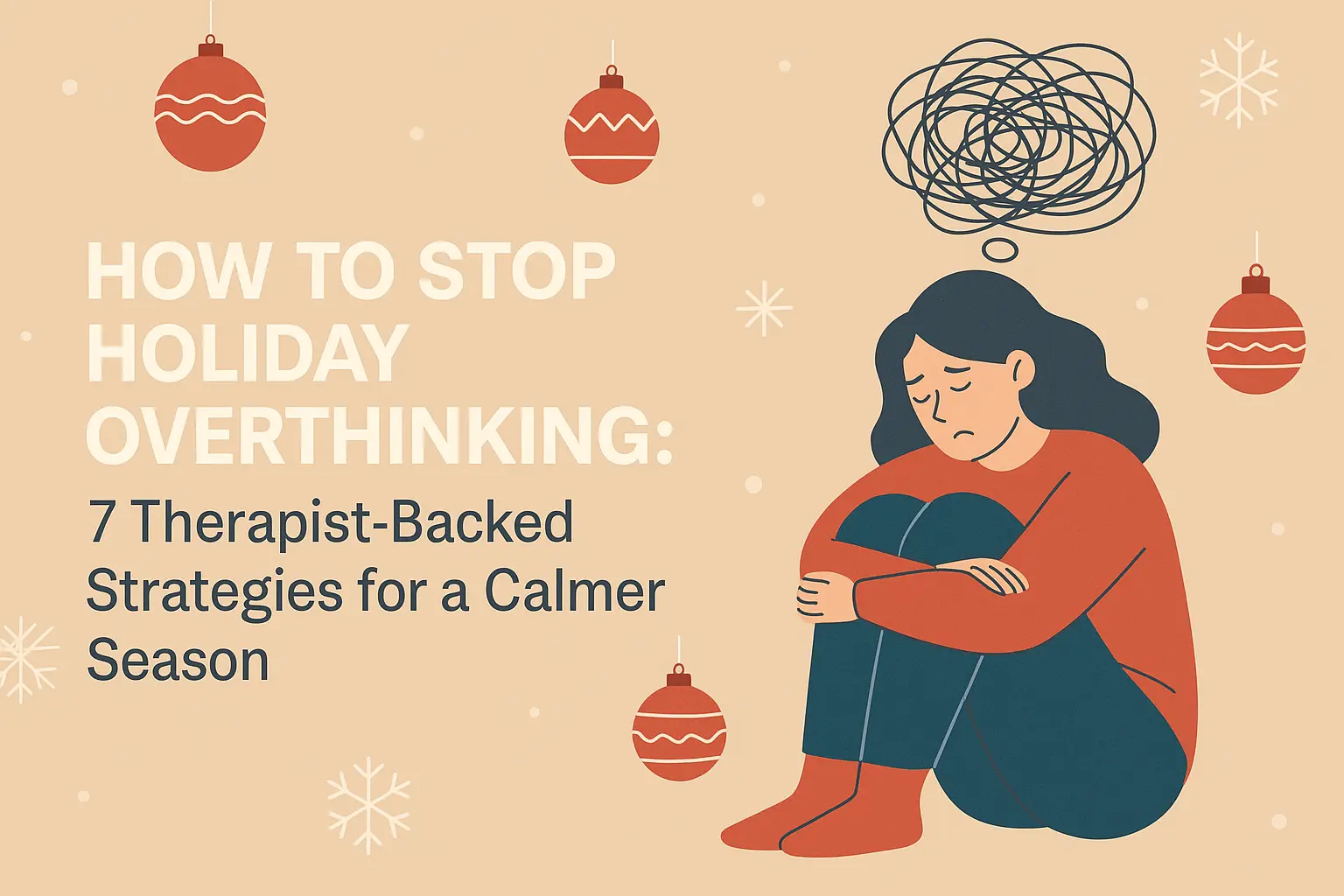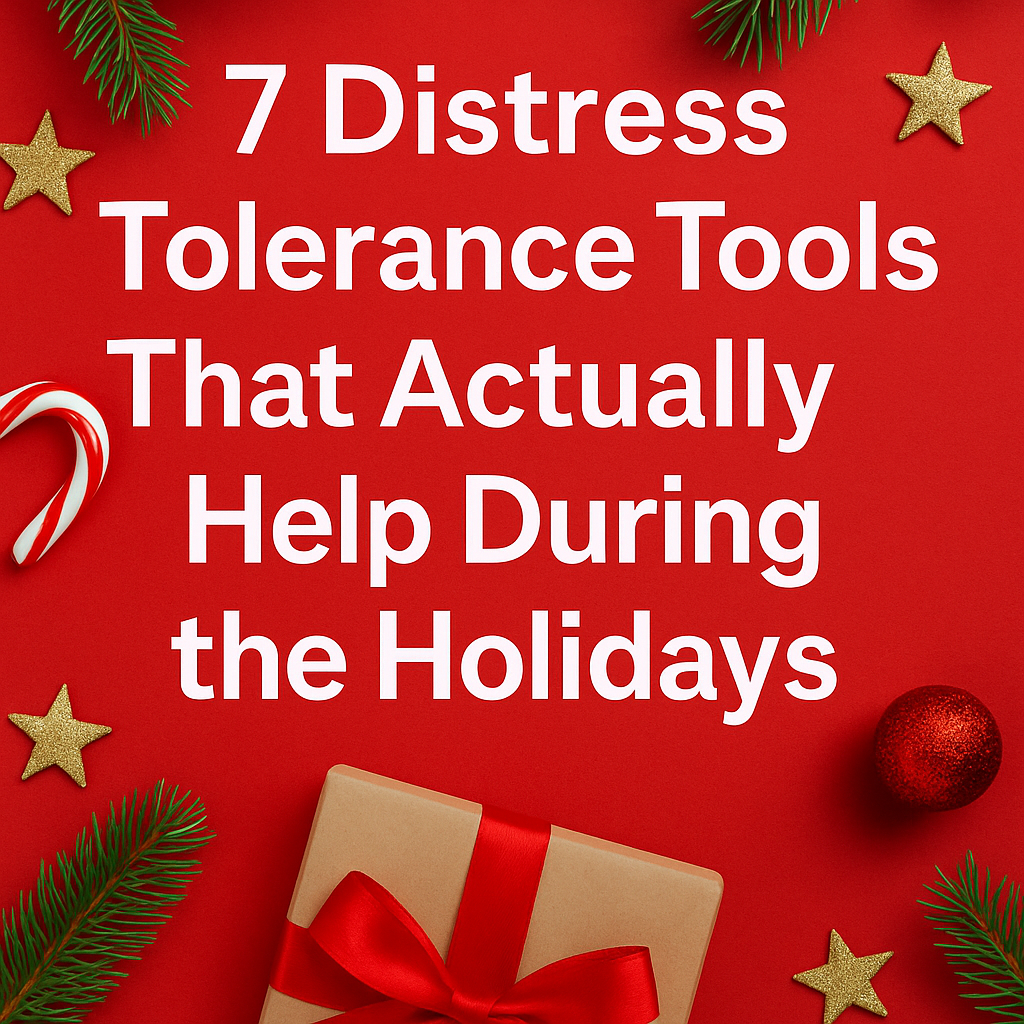The holidays are supposed to be joyful — twinkling lights, cozy gatherings, a sense of togetherness. But if you’re prone to overthinking, they can quickly become a mental minefield.
Did I buy the right gift?
What if the family dinner turns into another argument?
Why did I say that awkward thing at last year’s party?
Sound familiar? You’re not alone. Overthinking, rumination, and intrusive thoughts tend to spike during the holidays, when expectations are high and downtime is scarce.
The good news? You can learn to quiet the mental noise.
That’s why I created the Overthinking Survival Kit — a free set of therapist-designed worksheets and exercises you can use anytime holiday stress starts spiraling.
In this post, I’ll share seven strategies from my Overcoming Overthinking, Rumination, and Intrusive Thoughts Workbook, adapted for the holiday season. These tools are practical, easy to use, and designed to bring you back into the moment — where real joy happens.
1. How to Recognize When Holiday Stress Has Turned Into Overthinking
The holidays pile on decisions and expectations, so it’s easy to slip into overthinking without realizing it.
Signs you’re spiraling include:
- Spending hours second-guessing gifts or menus
- Replaying old family conflicts in your head
- Imagining every possible disaster about travel or gatherings
- Feeling mentally exhausted but not closer to clarity
👉 Try this: Next time you feel stuck, pause and name it: “I’m not problem-solving — I’m overthinking.” Even that small shift creates space to respond differently.
2. A Simple Way to Stop Catastrophic Holiday Thinking
Holiday overthinking often takes the form of worst-case scenarios: “The turkey will burn. Everyone will fight. The whole day will be ruined.”
To break that loop, try the Best-Case / Worst-Case / Most-Likely method:
- Worst-case: The turkey dries out and we order pizza.
- Best-case: Dinner is delicious and everyone feels connected.
- Most likely: Dinner has a few hiccups, but it’s fine overall.
👉 This balances perspective and keeps holiday “what-ifs” from running wild.
3. How to Stop Replaying Awkward Holiday Moments
Do you ever wake up the day after a party replaying every awkward thing you said? That’s rumination — your brain stuck on replay.
Instead of spiraling into shame, try reframing: What can I learn from this?
👉 Example: Instead of “Why did I tell that weird story at the table?” reframe it as: “Next time, I’ll pause before speaking when I feel nervous. That’s a skill I’m building.”
This isn’t about toxic positivity. It’s about shifting from self-criticism to growth.
4. What to Do With Intrusive Thoughts That Crash Your Holiday
Holiday intrusive thoughts can sound like: “What if I ruin everything?” or even random, dark mental images that feel out of place in a festive setting.
Remember: intrusive thoughts are just thoughts — not facts, and not reflections of who you are.
👉 When one shows up, try saying: “That’s just my brain making noise.” Imagine the thought floating away on a snowflake or an ornament drifting down a river.
The less you fight it, the faster it passes.
5. How to Contain Holiday Worry Before It Hijacks Your Day
Holiday to-do lists are endless, which makes it easy for worry to take over every waking moment. That’s where Worry Scheduling comes in.
Here’s how:
- Pick a 15-minute “worry time” each day.
- When a worry pops up (“Did I forget someone’s gift?”), jot it down.
- Tell yourself: “I’ll deal with this at 7 PM.”
By the time “worry hour” arrives, half your list won’t even feel urgent. The ones that do? You can approach with more clarity.
6. How to Let Go of Holiday Overthinking Without Fighting It
Sometimes the harder you try to stop overthinking, the stronger it gets. That’s why I love the Catch & Release method.
When a holiday worry shows up:
- Say: “I’m noticing I’m having this thought.”
- Imagine tying it to a balloon and letting it float upward.
- Watch it drift away without engaging.
This creates distance between you and the thought — so it doesn’t control your mood or actions.
7. Building Long-Term Calm Beyond the Holiday Season
These skills aren’t just for December. Overthinking thrives on repetition, so the antidote is consistent practice.
👉 Ideas for building new habits:
- Pair a “Catch & Release” moment with your morning coffee.
- Schedule “worry time” into your evening routine.
- Celebrate small wins: “I caught myself before I spiraled about gifts today — that’s progress.”
Over time, these practices rewire your relationship with thoughts, giving you more space for calm and connection.
Free Resource: The Overthinking Survival Kit
Reading about these skills is powerful — but practicing them is what truly changes your brain. That’s why I created the Overthinking Survival Kit.
It’s a free set of printable worksheets and exercises designed for moments when holiday stress is at its peak. Inside, you’ll get:
- Step-by-step guides for catching spirals
- Printable worry scheduling sheets
- Quick reframing prompts you can keep handy during gatherings
The Survival Kit is your starter pack — and if you want to go further, the Overcoming Overthinking, Rumination, and Intrusive Thoughts Workbook will take you deeper with structured exercises and strategies to transform your relationship with your mind.
Final Thoughts
The holidays will never be perfectly calm or conflict-free — but your mind doesn’t have to spin out every time something goes wrong.
By learning to spot spirals, reality-check your thoughts, and let them go, you can create more mental space for what the holidays are really about: connection, meaning, and joy.
👉 Ready to start? Download your free Overthinking Survival Kit today and give yourself the gift of a calmer mind this holiday season.







